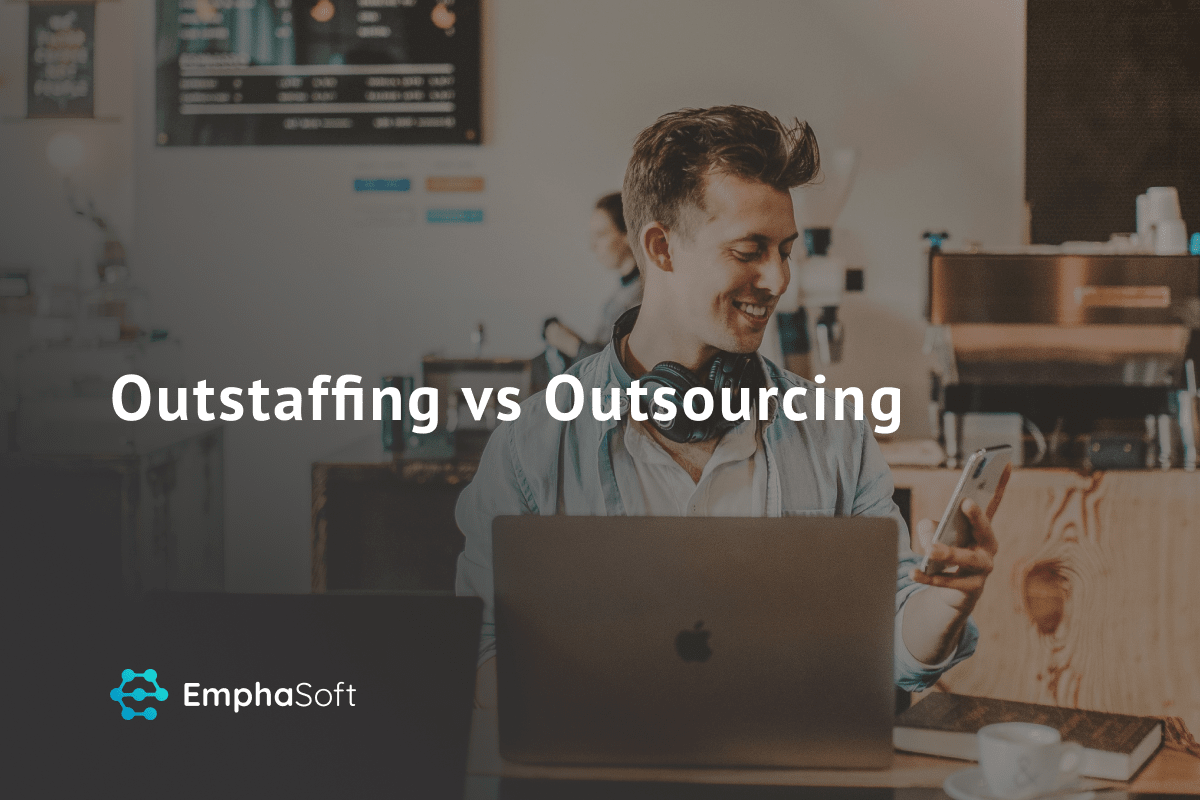The terms outsourcing and outstaffing are often used interchangeably as though they are the same thing. There is, however, a subtle difference between the two concepts which is important to understand for anyone looking to expand their team.
In today’s article, we will cover the topics of software development, outstaffing and outsourcing. We will also answer the question, ‘Why do companies outsource software development at all?’
What is outsourcing?
According to Investopedia, outsourcing is the practice of hiring staff outside of a company (and often the country) to complete the work that would typically be done by in-house employees.
Companies and startups outsource primarily to access the most experienced and knowledgeable talent and to get the best value for their money, i.e. hire at a lower rate than in the domestic labour market. For example, an IT vendor in the US can hire a call center in Romania to handle customer support.
The concept of outsourcing is sometimes criticised as unethical, although it is not necessarily exploitative by default because many companies offer compensation above the average regions’ salary rates.

Why outsource software development?
Many IT startups use software development outsourcing because they are financially unable to hire the full team at the moment, or the workload they can offer is far below the minimum to justify permanent hiring. Well-established businesses can choose outsourcing as a shortcut to getting results without the need to hire and manage the team.
One of the main benefits of outsourcing is that it is very flexible in terms of payment. Hourly, weekly, or monthly compensation is possible and agreed on individually. The downside is that the employer has no control over what else the outsourced staff is doing, so if the company prefers working on exclusive terms, that might be an issue.
How to successfully outsource software development
Outsourcing can be a lifesaver but only if you do it right. Here are some of the tried-and-tested tips to help you ace outsourcing from the beginning:
1. Don’t be lost in translation. Make sure you and the outsourced team members speak the same language. You may find the most talented developers in the world, but unless they understand what you’re saying, their expertise will go to waste.
2. Watch the clock. Time differences can be an issue if your common working time is severely limited. Make sure there is a decent cross-over in your working day so that there’s an opportunity to host joint meetings and ask for ad-hoc updates and changes.
3. Check regulations. Contracts, billing, and financial regulations vary by location, and depending on where your outsourced partners are it can be easier or more difficult to handle financial matters. It’s best to find out all the nuances and build a process before the actual work starts.
4. Ask for a portfolio and references. Every professional with experience can provide at least a couple of references and examples of their work. If such a request is met with protests, it might be a bad sign.
What is outstaffing
Outstaffing is not as well-known as outsourcing but it represents another great opportunity for the company to manage its workforce.
With outstaffing, the professional is leased via an outstaffing agency to work for the company. Typically, such a format of employment is used for project-based work. The leased talent is usually expected to work exclusively with that one client.
Unlike with outsourcing, where the outsourced party takes over the process from start to finish, the outstaffed professional joins the existing team and becomes a part of it.
One of the benefits of outstaffing is that the company receives a guarantee that the specialist is working with them only, and will not be engaged in side projects. However, such a hiring format can be rather costly and might not fit everyone. Still, it is usually still cheaper for the company compared to traditional employment, especially if the business need is only a short-term one.
Another factor that attracts businesses to outstaffing is that the agency takes care of all HR-related issues like hiring, paying salaries and taxes, providing benefits, etc. So, the company that has leased the professional does not need to worry about those things.

How to successfully outsource IT development with Emphasoft
If you require assistance for your IT projects but are not sure how to outsource software development, don’t worry! We are here to help.
Emphasoft’s team consists of experienced and reputable professionals who can deliver a project of any kind, size, and complexity. During the 3+ years that Emphasoft has been in the market, we have delivered more than 135 projects for different clients around the world.
Here are some of the things that we specialise on:
- Mobile apps development
- Web apps development
- Database solutions
- Project management
- UX/UI design
- Legacy solutions’ modernisation
- Business process automation
Please reach out to us to discuss how we can help your business, and our team will start working on your project within 3 days.









 Schedule a Discovery Call
Schedule a Discovery Call Schedule Call
Schedule Call